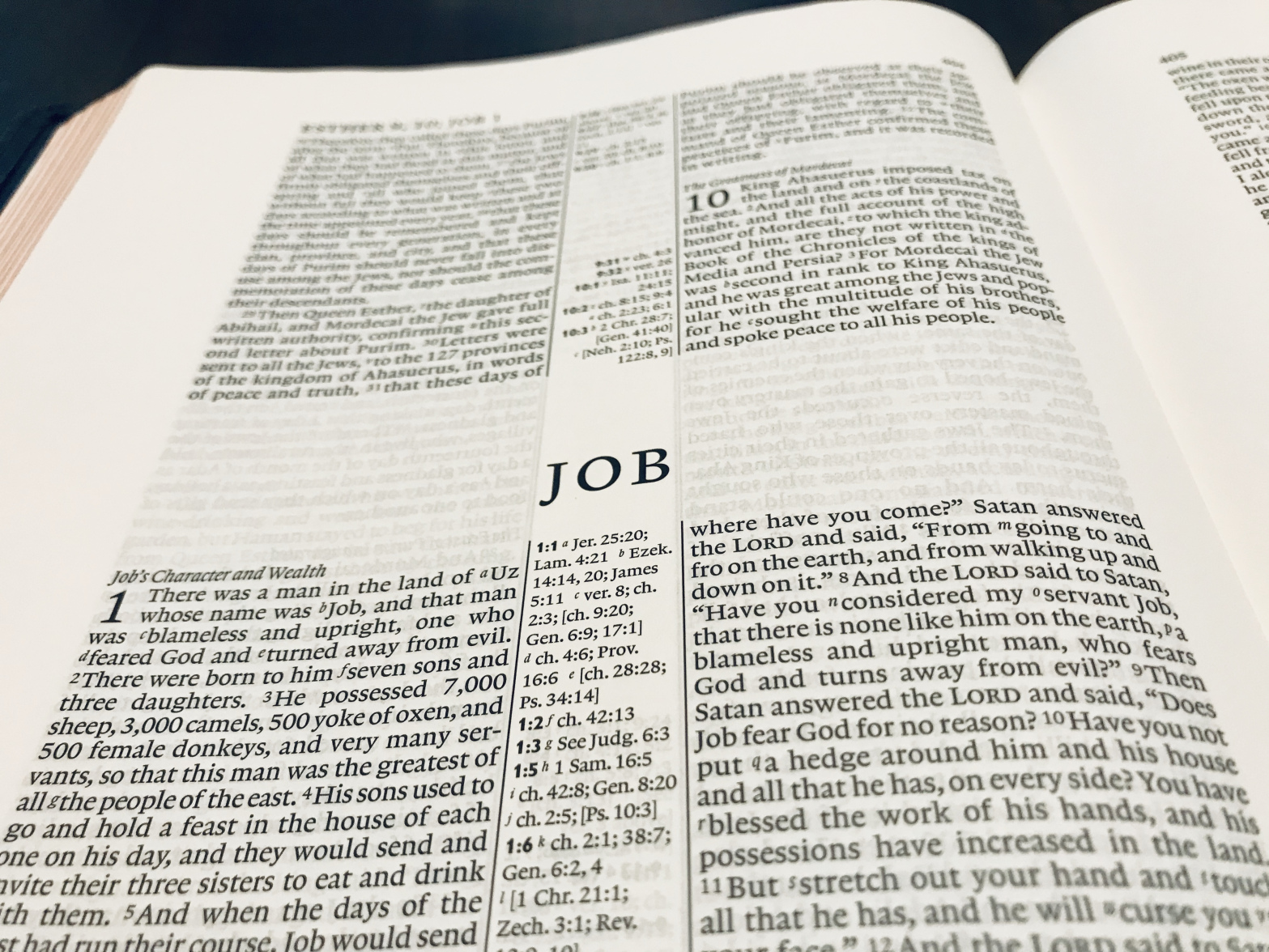Note: This is the introduction to a new series of posts from the book of Job. In this post, I will do my best to summarize the book, address common issues in making sense of it, and outline some tools I will use throughout the series.
There are certain books throughout of a Bible-in-a-Year plan that tend to bog down the momentum. If you persevere through Leviticus, with a refreshed knowledge of how to diagnose a leprous disease, you get to Numbers and you realize it lives up to its name; they counted each person! You get through 1st and 2nd Kings, only to realize you need to re-read much of the story again in 1st and 2nd Chronicles. And you get through a quick read like Esther, only to encounter the book of Job. Job starts an easy-to-read story but then descends into a long cycle of dialogue on Job’s life, God’s character, and some things in-between for 35 chapters before God chimes in.
Job: The Righteous Sufferer
If you are not familiar with the book of Job, I will give you a quick overview, or you can read Job 1-2. Job is the wealthy patriarch of his family and is described in the first verse of the book as, “blameless and upright, one who feared God and turned away from evil. (Job 1:1)”
The scene of the book then shifts, and we find ourselves in the very courts of heaven where the angels are presenting themselves to God. Satan then wanders into the scene. God points out Job to Satan and his example godliness. The devil then makes a bet with God, “Does Job fear God for no reason?…stretch out your hand and touch all that he has, and he will curse you to your face. (Job 1:9,11)” God gives Satan permission to interrupt Job’s life, and in a single day, Job loses his flocks, many of his servants, his children. Some days later, Job will lose his health as Satan afflicts him with boils from head to toe. At the end of all this, we have Job sitting in ashes and scratching his boils with shards of pottery yet, “In all this Job did not sin with his lips. (Job 2:10)”
Who Do We Trust?
Job’s suffering is hard to make sense of much less the 35 chapters of dialogue between Job and his friends. They get off to a great start. They come to Job in his distress, tear their clothes, weep, and sit with their friend in silence for seven days (Job 2:12-13). Then Job starts talking about his situation, and opens the floodgates for 35 chapters of back and forth. The words go on and on without any narrator or authority helping us discern what is true and what is false. In the interior chapters of Job, it is hard to know who we can trust.
Making Sense of Many Words
My purpose in this series of posts is to organize the book of Job into a series of major themes that we can apply to our lives. I will not be moving verse and by verse and I don’t know Hebrew, I am simply grouping together common phrases and ideas to better understand the words God preserved for us from Job 3-38.
We will look at questions like: “Bad things happen to bad people”, “Good things happen to good people”, “Where is God in my suffering?”, and “Why do the wicked prosper?” These are questions all of us have asked and God wants us to understand from his Word.
In order to do this, I will be using some tools to help organize my thoughts. John Piper laid out some helpful tips a few weeks ago that have helped me and I wanted to outline them for you here:
1. Good theology can be misapplied
Job is full of true theology exaggerated beyond its intended application. When we take truths about God and apply them to our lives, we need to be careful to let the balance of God’s Word guide us, not be drawn into extremes.
2. Pay close attention to the narrator
The Narrator, in this case, is the unnamed author of the book. His words are inspired by God, as all Scripture is, but differently from the speeches of Job’s friends. Job’s friends can say wrong things, the narrator will not.
3. Weigh Elihu’s words differently
When God shows up in Chapter 42 to rebuke Job’s friends, he does not address Elihu. This leads Piper to believe (and I agree) that Elihu’s perspective is unique in comparison to the others.
4. Consider carefully God’s perspective
God cannot lie or change his mind; this means that whatever he said to Job, he would repeat to us today in the same situation. We must humble ourselves to hear from God, whether we like what he has to say or not.
5. Look out for Job’s repentance
In chapter 42:1-6 Job responds to God’s rebuke; these verses carry a more weight than the emotionally charged words of the earlier chapters.
6. Use the rest of Scripture like a sieve
The Bible is the best tool to bring clarity to the Bible. Scripture is consistent and God-breathed, we will find no better answer than the answer the Bible gives about itself.
A Mountain to Climb
I will admit, this is a massive task ahead of me, and I will not do it perfectly, but I hope we can grow together in taking time to dig into hard passages rather than giving them a cursory reading every few years.
Discussion:
What is the biggest unanswered question you have from the book of Job? Do you have any verses or concerns from the book of Job that stand out to you? If so, post them in the comments and I’ll add them to the list I am creating as we work through this together.

